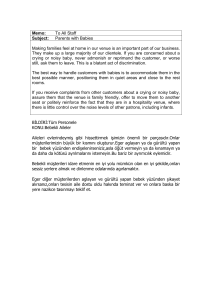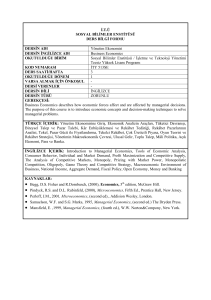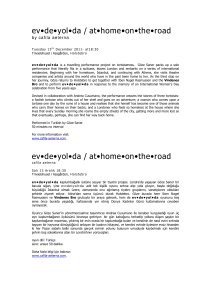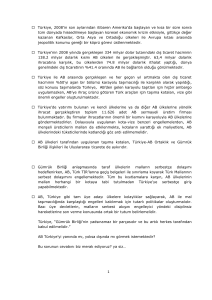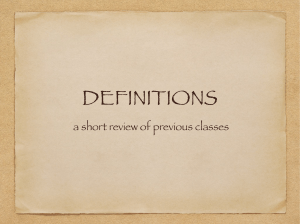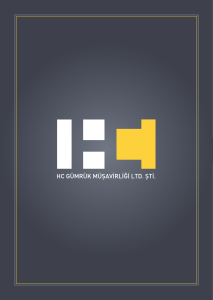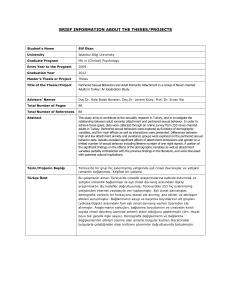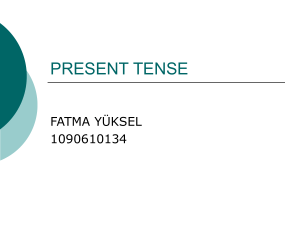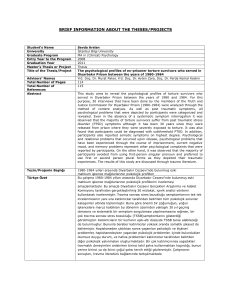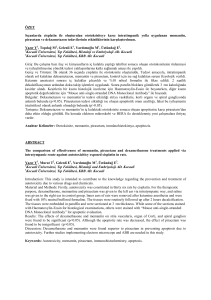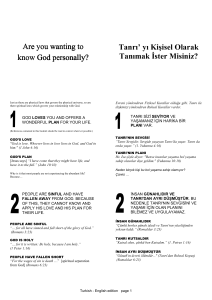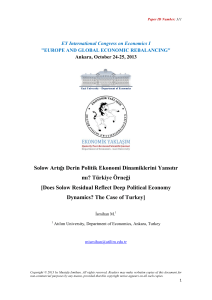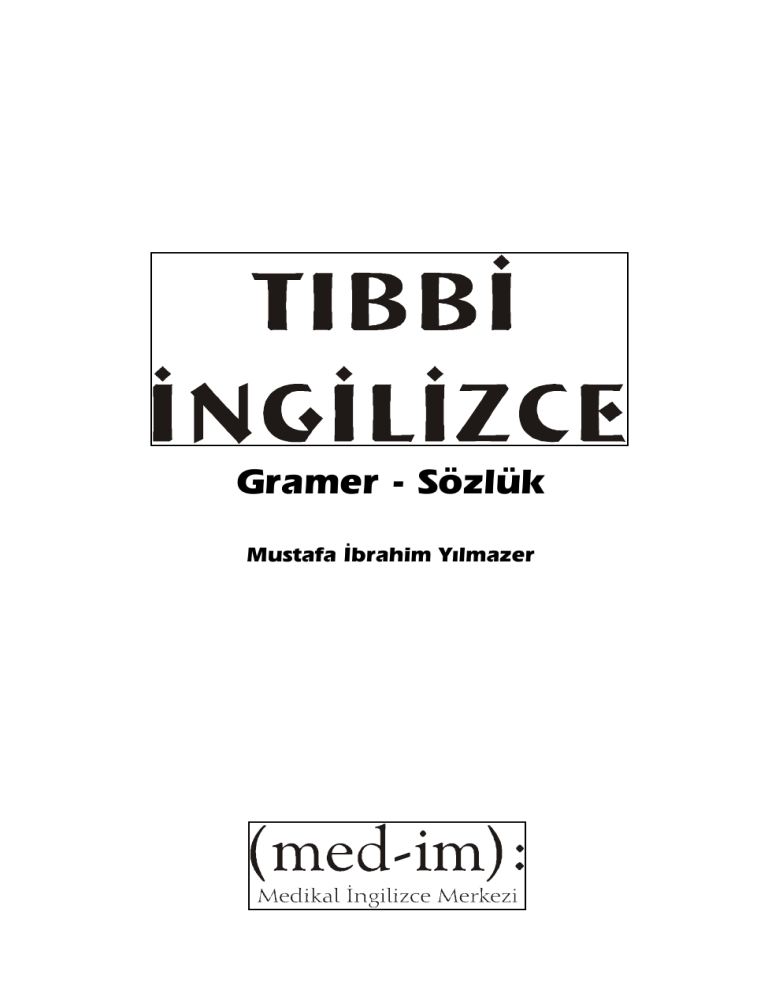
TIBBİ İNGİLİZCE
Gramer - Sözlük
Mustafa İbrahim Yılmazer
İngilizce Gramer - Sözlük
Mustafa İbrahim Yılmazer
ISBN 975-93206-0-6??????????
Medikal İngilizce Merkezi Yayınları: 2
© Bu kitabın tüm yayın hakları MEDİM’e aittir.
Birinci Baskı Ankara, Şubat 2007
Kapak Tasarım ve Ofset Hazırlık
Düş Atelyesi (312) 215 70 37
Baskı
Pelin Ofset (312) 418 70 93
Strazburg Caddesi, 16/28
Sıhhiye - Ankara
Tel: (312) 232 32 83
e-mail:[email protected]
www.medikaling.com
TIBBİ İNGİLİZCE
TIBBİ İNGİLİZCE
İçindekiler
ÖNSÖZ . ...............................................................................................................5
BÖLÜM I
1. TENSES IN ENGLISH – ETKEN ÇATI .........................................................7
2. MODAL VE MODAL BENZERİ YAPILAR .................................................19
3. PASSIVE VOICE – EDİLGEN ÇATI ............................................................27
4. EŞ YAPILAR ..................................................................................................33
5. “THAT” İLE KURULAN DİĞER YAPILAR VE BENZERLERİ . ................36
6. SORU KELİMELERİ İLE KURULAN CÜMLELER . ...................................43
7. “EVER” İLE BİTEN KELİMELERLE KURULAN ÖBEKLER
VE CÜMLELER ..........................................................................................44
8. AS ...................................................................................................................46
9. RELATIVE CLAUSES – SIFAT CÜMLECİKLERİ ......................................51
10. BAĞLAÇLAR ..............................................................................................61
11. CONDITIONALS – KOŞUL CÜMLECİKLERİ . .......................................89
12. REDUCTION OF CLAUSES – CÜMLELERİN KISALTILMASI..............96
13. CAUSATIVE – ETTİRGEN YAPI ..............................................................98
14. İFADE EKONOMİSİ .................................................................................100
15. SUFFIXES – SONEKLER ..........................................................................104
16. PREFIXES – ÖNEKLER . ...........................................................................108
17. NOMINALIZATION – TAMLAMA OLUŞTURMA .............................110
18. PARTICIPLES ............................................................................................115
19. INVERSION – DEVRİK CÜMLE .............................................................126
TIBBİ İNGİLİZCE
BÖLÜM II
ALIŞTIRMALARIN YANIT ANAHTARI
1. TENSES IN ENGLISH – ETKEN ÇATI .....................................................133
2. MODAL VE MODAL BENZERİ YAPILAR ...............................................140
3. PASSIVE VOICE – EDİLGEN ÇATI ..........................................................142
4. EŞ YAPILAR ................................................................................................145
5. “THAT” İLE KURULAN DİĞER YAPILAR VE BENZERLERİ . ..............146
6. SORU KELİMELERİ İLE KURULAN CÜMLELER . .................................149
7. “EVER” İLE BİTEN KELİMELERLE KURULAN ÖBEKLER
VE CÜMLELER ........................................................................................150
8. AS .................................................................................................................151
9. RELATIVE CLAUSES – SIFAT CÜMLECİKLERİ ....................................154
10. BAĞLAÇLAR ............................................................................................159
11. CONDITIONALS – KOŞUL CÜMLECİKLERİ . .....................................172
12. REDUCTION OF CLAUSES – CÜMLELERİN KISALTILMASI ..........175
13. CAUSATIVE – ETTİRGEN YAPI ............................................................176
14. İFADE EKONOMİSİ .................................................................................177
17. NOMINALIZATION – TAMLAMA OLUŞTURMA .............................180
18. PARTICIPLES ............................................................................................183
19. INVERSION – DEVRİK CÜMLE .............................................................189
BÖLÜM III ...................................................................................................... 193
SÖZLÜK............................................................................................................212
TIBBİ İNGİLİZCE
Önsöz
Bu kitap, uzun yıllardır verdiğimiz Tıbbi İngilizce derslerinde edinmiş
olduğumuz deneyimlerin ürünüdür. Amacımız, öğrencilerin çeviri derslerinde
gördükleri gramer kalıplarını bir araya getiren, gereğinde başvurabilecekleri
ayrıntılı bir kaynak oluşturmaktır. Kitap, Tıbbi İngilizcede kullanılan gramer
kalıplarını öğrenmek, gözden geçirmek ya da hatırlamak için ders desteği
olmadan da kullanılabilir.
Öncelikle, Tıbbi İngilizceyle neyin kastedildiğini açıklamak gerekir.
“ESP” (English For Specific Purposes) bağlamında ele alınabilse de, Tıbbi
İngilizceyi bir altdil ya da üstdil gibi görmemek gerekir. Aslında Tıbbi
İngilizce, genel olarak akademik İngilizceden farklı bir şey değildir. Bu noktada da akademik İngilizceyi tanımlamak gerekiyor. Akademik İngilizcenin
konuşma dilinden, daha çok biçem ve sözcük seçimiyle ayrıldığını söyleyebiliriz. Akademik İngilizcede konuşma dilinde fazla kullanılmayan belli
gramer kalıplarına ağırlıklı olarak yer verilir ve sözcüklerin de daha az bilinen
eşanlamlıları yeğlenir. Örnek vermek gerekirse, varsaymak anlamında en çok
bilinen kelime olan “suppose” değil, daha az bilinen “presume”, “assume”,
“postulate” gibi sözcükler kullanılır. Tıbbi İngilizce ile örneğin hukuk ya da
mühendislik İngilizcesi arasında bu yönden büyük bir fark yoktur. Hepsi
bu ortak dile, yani akademik İngilizceye kendi terminolojilerini ekler. Tıp
terminolojisi ise daha çok Yunanca ya da Latince kökenli sözcüklerden
oluşur. Tıp dilinde teknik terminoloji çok zengin olduğundan, metinleri
çevirebilmek için daha sınırlı bir İngilizce yeterli olabilir. Örneğin sosyal
bilimler, gramer ve sözcük dağarcığı bakımından çok daha kapsamlı olduğu
TIBBİ İNGİLİZCE
ve konuşma diliyle daha çok örtüştüğü için, sosyal bilim konularında çeviri
yapmak nispeten daha zordur.
Şimdi biraz da bu kitabın nasıl kullanılacağı üzerinde duralım. Her gramer
kalıbı verildikten sonra konu, yanıtları kitabın sonunda (II. Bölüm) verilen
çeviri alıştırmalarıyla pekiştirilmeye çalışılmıştır. Alıştırmaların bir avantajı
da, hemen hemen tümünün tıp kitapları ve dergilerinden alınmış olmasıdır.
Yani, alıştırma cümleleri sadece kalıba örnek vermek için uydurulmuş
yapay cümleler değildir. Ayrıca III. Bölüm’de çeviri alıştırması yapmak için
daha uzun pasajlar da var. Kitabın ikinci kısmı da Tıbbi İngilizce'de en çok
kullanılan sözcüklerin yer aldığı sözlüğü içeriyor. Sözlüğü kullanmadan önce
başındaki notu okumanızı öneririz.
İyi çalışmalar…
TIBBİ İNGİLİZCE
BÖLÜM I
1. TENSES IN ENGLISH – ETKEN ÇATI
Tıbbi metinlerde bazı zaman kipleri diğerlerinden daha fazla kullanılır.
Yani ağırlıklı olarak “the simple present tense”, “the simple past tense”,
“the present perfect tense”, “the future simple” tercih edilir. Bu nedenle
alıştırma sayısı da konunun önemine göre değişecektir.
1.1. The Simple Present Tense
1.1.a. Türkçedeki geniş zaman kipi gibi düşünülebilir. Genel doğruları
ifade etmek için kullanılır.
q Lyme borreliosis affects mainly the skin, the nervous system, the heart, and
the joints.
“Lyme borreliosis” esas olarak cilt, sinir sistemi, kalp ve eklemleri etkiler.
Alıştırmalar
1. Does the pain radiate to gluteal region, thighs, or legs?
2. The male appears to be the biologically weaker sex.
3. Recurrent allergic rhinitis in early childhood is a common cause of adenoidal hypertrophy and obstruction of the nasal passages.
4. The characteristic features of the infection with varicella-zoster vi­rus
are encephalitis, low birth weight, hypoplastic limbs, skin deformities and
choroidoretinitis.
TIBBİ İNGİLİZCE
1.1.b. Belirli aralıklarla gerçekleşen, alışkanlığa dönüşmüş ya da
otomatikleşmiş olguları anlatmada “frequency adverbs” (sıklık zarfları) ile
birlikte kullanılır.
q Haemorrhoidectomy frequently leads to postoperative pain.
Hemoroidektomi sıklıkla postoperatif ağrıya neden olur.
Alıştırmalar
1. The tachycardia frequently subsides during the examination.
2. Sinus arrhythmia is rarely clinically obvious in adults.
3. Sinus bradycardia seldom gives rise to symptoms or undesirable haemodynamic effects.
4. Atrial tachycardia is often the consequence of an accelerated au­to­
matic focus in atria.
1.2. The Present Continuous Tense
1.2.a. Şu anda gerçekleşen eylemleri aktarmada:
q The physician is examining the patient at the moment.
Doktor şu anda hastayı muayene ediyor.
Alıştırmalar
1. Is the pain increasing?
2. The nurse is dressing the wound right now.
3. The resident is taking fine needle biopsy from the thyroid gland.
4. The nurse is inserting the catheter into the vein.
5. The ophthalmologist is inspecting the patient’s right eye.
1.2.b. Türkçede “şu aralar” biçiminde ifade ettiğimiz zaman diliminde
meydana gelen olaylardan bahsederken:
q At present authorities are placing greater emphasis on earlier de­tection.
Günümüzde yetkililer erken teşhise daha fazla önem veriyorlar.
TIBBİ İNGİLİZCE
Alıştırmalar
1. The interns in neurology clinic are working hard.
2. Many scientists are seeking a cure for AIDS.
3. The hospital staff is vaccinating the children in the city against chol­
era this week.
4. The professor from The John Hopkins Hospital is giving lectures about
preventive medicine this week.
5. The newly developing countries such as Taiwan, South Korea, and
Singapore are rapidly lifting themselves out of poverty.
1.2.c. Geleceğe yönelik plan ve programları ifade etmede:
q We are attending a conference tomorrow.
Yarın bir toplantıya katılacağız.
Alıştırmalar
1. We are operating on the patient tomorrow morning.
2. We are transplanting the kidney tomorrow.
3. They are holding a symposium on new imaging techniques next
week.
4. Forensic scientists are examining the wreckage for clues about the
cause of the explosion this week.
1.3. The Present Perfect Tense
1.3.a. Geçmişte gerçekleşmiş; ancak ne zaman gerçekleştiğini kesin olarak
bilmediğimiz olaylardan söz ederken:
q Five of the patients have undergone transplantation for end-stage liver
dis­ease.
Son evre karaciğer hastalığı için hastalardan beşine transplantasyon
yapıldı.
10
TIBBİ İNGİLİZCE
Alıştırmalar
1. Has the patient taken any analgesic?
2. Modern culture has put an additional pressure on the body’s immune
system.
1.3.b. Olayın geçtiği zaman diliminin henüz sona ermediği durumlarda
“re­cently”, “lately” ve “this year/month/week” gibi ifadeler ile birlikte
kullanılır.
q Even in the developing world, the health has improved in recent years.
Gelişmekte olan ülkelerde bile son yıllarda sağlık düzeldi.
Alıştırmalar
1. Investigators have recently developed new imaging techniques.
2. The scientists have lately tested several therapeutic agents in clinical
trials in patients with motor neuron disease.
3. Lung cancer death in males has increased dramatically in Britain during the 20th century.
1.3.c. Geçmişte başlayıp günümüze kadar devam eden işi aktarırken:
q To date, they have reported no late complications of splenosis or splenic
cyst formation.
Şimdiye kadar splenozis ya da splenik kist oluşumu gibi geç dönemdeki
komplikasyonları rapor etmediler.
Alıştırmalar
1. They have not found a cure for AIDS so far.
2. Up to now, they have administered neurotrophic factors sub­cu­ta­
neously.
3. As yet no convincing theory on structure-activity relationships in
hallu­ci­no­genic drugs has emerged.
TIBBİ İNGİLİZCE
11
1.3.d. Geçmişte tamamlanmış olan işin süresini anlatırken “for” ya da
“since” ile birlikte:
q The scientists have debated respiratory function and its effect on orofacial
form for the past 100 years.
Bilim adamları son 100 yıldır solunum fonksiyonu ve onun orafasial form
üzerine etkisini tartışmaktalar.
Alıştırmalar
1. He has used cor­ti­cos­ter­oids since he graduated from high school.
2. For nearly a cen­tury, the term immunity has meant resistance to illness, usually infection.
3. The use of barbiturates has declined since the introduction of the
hyp­notic benzodiazepines.
4. Epidemics of in­fectious disease have been of importance since early
in man’s history.
1.3.e. Tamamlanan işin niceliğini belirtmede:
q Dr. Donald Smith has conducted two consecutive studies on sur­gical treatment of renal stones.
Dr. Donald Smith, renal taşların cerrahi tedavisi ile ilgili art arda iki
çalışma gerçekleştirdi.
Alıştırmalar
1. He has had two heart attacks in a month.
2. We have repeated the experiment three times to be sure.
3. The famous surgeon has made two operations with the new tech­
nique.
4. I have referred to three hospitals until the source of my pain is iden­
tified.
12
TIBBİ İNGİLİZCE
1.3.f. Etkisi süren bitmiş olayı aktarmada:
q A-They look tired.
B-They have vaccinated children today.
A-Yorgun görünüyorlar.
B-Bugün çocukları aşıladılar.
Alıştırmalar
1. I do not feel good. I have been ill for most of the month.
2. I am exhausted. I have studied for the anatomy exam.
3. Tom is in the hospital. He has had a car accident.
4. Mary is in the asylum. She has had a nervous breakdown.
1.4. The Present Perfect Continuous Tense
1.4.a. “The Present Perfect Tense”in iki görevini daha iyi ifade ettiği
kabul edilmektedir. Tamamlanmış olup etkisi süren olayı vurgulamak
istediğimizde:
q A-They look tired.
B- They have been vaccinating children against cholera.
A-Yorgun görünüyorlar.
B- Çocukları koleraya karşı aşılıyorlardı.
1.4.b. Bir işin ne kadar sürdüğünü vurgulamak için:
q They have been vaccinating the children since morning.
Sabahtan beri çocukları koleraya karşı aşılıyorlar.
Alıştırmalar
1. He has been taking labetalol since last year.
2. I am exhausted. I have been studying for the anatomy exam.
3. We have been encountering dysentery for the last two years.
TIBBİ İNGİLİZCE
13
4. The investigation team has been following the study group for a decade.
5. She has been seeing a psychiatrist ever since her divorce.
1.5. The Simple Past Tense
1.5.a. Gerçekleştiği zamanı kesin olarak tayin edebildiğimiz olayı ifade
etmede:
q They discovered the first cases of primary-resistant leprosy in 1977.
İlk primer rezistan lepra vakalarına 1977’de rastladılar.
Alıştırmalar
1. The great London Smog caused a sudden increase in death in De­cem­
ber 1952.
2. Histological examination revealed root surface resorption in 10 out of
11 teeth in the study group.
3. We analyzed risks in twins of patients with breast cancer at young ages
or with testicular cancer.
1.5.b. Geçmişteki alışkanlıklarımızı anlatırken “frequency adverbs”
(sıklık zarfları) ile birlikte kullanılır.
q He rarely smoked.
Nadiren sigara içerdi.
“Simple Past Tense”in bu görevini “used to” yapısı da yerine getirebilir.
q Patients with diabetes used to inject insulin by themselves.
Diabetli hastalar insülini kendileri enjekte ederlerdi.
Alıştırmalar
1. Measles often led to chronic suppurative otitis media in the past.
2. Tuberculosis usually caused deaths in the past.
14
TIBBİ İNGİLİZCE
3. Transplantation operations used not to be successful.
4. Before the discovery of antibiotics, people used to die of infection.
1.6. The Past Continuous Tense
1.6.a. Geçmişte başlayıp, yine geçmişte belli bir zaman noktasında hâlâ
devam eden eylemi aktarırken:
q After 26 years, 41 subjects in the quitters group were still not smoking.
Bırakan gruptaki 41 denek 26 yıl sonra bile sigara içmiyordu.
Alıştırmalar
1. Fifty million people were living in England and Wales in 1975.
2. We were still draining the wound at 9 p.m.
3. The patient was still sleeping two days after the operation.
4. Thousands of people were living in Gölcük before the earthquake.
1.6.b. Devam eden olayı başka bir olay kesebilir. Bu durumda, devam
eden olay “the past continuous tense”, onu kesen olay “the simple past
tense” ile aktarılır. Ek olarak, hemen hemen aynı anda başlayıp aynı anda
sonlanan ve bir süre devam eden olayların her ikisi de “while” ve “the past
con­tinuous tense” kullanarak aktarılır.
q While they were operating on the patient, the electricity cut off.
Onlar hastayı ameliyat ederken elektrik kesildi.
Alıştırmalar
1. While the rash was fading, lobar pneumonia appeared.
2. While we were preparing the intravenous solution, the fluid crys­
tallized.
3. While the physician was performing auscultation, the patient was
taking deep breath.
4. The patient had a heart attack while we were performing echocardio­
graphy.
TIBBİ İNGİLİZCE
15
1.7. The Past Perfect Tense
1.7. Geçmişte olan iki olayı karşılaştırırken daha önce gerçekleşeni aktarmada:
q He found that 20 percent of the mothers had taken a mild, harmless, sedative drug.
Annelerin % 20’sinin hafif, zararsız ve sedatif bir ilaç aldığını keşfetti.
Alıştırmalar
1. He had presented to the hospital with fever and diarrhea before he
died of a sudden cardiac shock.
2. He referred to our hospital because he had had flank pain.
3. The wounded man had been dead for an hour when the ambulance
arrived.
4. The surgeons in prehistory had made many successful operations with­
out sophisticated equipment.
5. Eligible subjects of both sexes had smoked at least 15 cigarettes a
day.
1.8. The Past Perfect Continuous Tense
1.8. “Past Perfect Tense” ile anlatılan eylemin süresi önemli
olduğunda:
q He had been lecturing on anatomy for ten years when he decided to change
his subject.
Branşını değiştirmeye karar verdiğinde on yıldır anatomi dersi veriyordu.
Alıştırmalar
1. He had been using this drug until he stopped it because of allergy.
2. He had been jogging for an hour when he injured his ankle.
3. She had been crying for two days when her condition was diagnosed
as nervous breakdown.
16
TIBBİ İNGİLİZCE
4. Eligible subjects of both sexes had been smoking at least 15 ciga­rettes
a day for one year.
1.9. The Future Simple
1.9.a. Kesinlik ifade edilirken:
q Polyuria will lead to dehydration and electrolyte imbalance.
Poliüri dehidratasyona ve elektrolit dengesizliğine neden olur /olacaktır.
Alıştırmalar
1. Each patient will react to his disease and treatment differently.
2. The chancre will often disappear spontaneously within three to eight
weeks.
3. The changes in less technologically advanced countries will be even
more striking.
4. The physician’s attitude toward patients with headache will almost
certainly influence the results of the treatment.
1.9.b. Konuşma anında verilen kararlar:
q We will take the child to the hospital.
Çocuğu hastaneye götüreceğiz.
Alıştırmalar
1. We will describe briefly the major components of the immune sys­tem
now.
2. The professor will show the mechanism of defibrillator.
1.10. Going to
1.10.a. Planlanmış işlerden söz ederken:
q They have bought some paint. They are going to paint the theater.
Boya aldılar. Ameliyathaneyi boyayacaklar.
TIBBİ İNGİLİZCE
17
Gördüğünüz gibi, “will” ve “going to” yapıları ile oluşturulan zaman kiplerinin İngilizcede görevleri farklı olsa bile, Türkçeye aynı sonek yani
-ecek ya da -acak ile aktarılır.
Alıştırmalar
1. We are going to discharge the patients in our clinic.
2. This new method is going to revolutionize the field of surgery.
1.11. The Future Continuous Tense
1.11. Gelecekte belli bir zamanda devam edecek olan eylemi
aktarırken:
q They will be sitting in the outpatient clinic at this hour tomorrow.
Yarın bu saatte poliklinikte oturuyor olacaklar.
Alıştırmalar
1. We will be conducting this study this time next year.
2. Investigators will be distributing questionnaires to patients this time
next week.
1.12. The Future Perfect Tense
1.12. Gelecekte bitmiş olacak olaydan bahsederken:
q They will have updated this meta-analysis by January.
Ocak ayında bu meta-analizi güncelleştirmiş olacaklar.
Alıştırmalar
1. We will have finished operation by six p.m.
2. We will have discharged the patient by tomorrow.
3. The patient will have died by the time the ambulance arrives.
18
TIBBİ İNGİLİZCE
1.13. The Future Perfect Continuous Tense
1.13. Gelecekte tamamlanacak olayın süresi önem kazandığında:
q The patient will have been sleeping for 15 hours by 8.
Saat 8’e geldiğinde hasta 15 saat uyumuş olacak.
Alıştırmalar
1. The surgical team will have been operating for six hours by 9.
2. You will have been receiving treatment for two years by next summer.
3. The researchers will have been investigating HSV infections in this
region for two years by next month.
19
TIBBİ İNGİLİZCE
2. MODAL VE MODAL BENZERİ YAPILAR
Aşağıda anlatılacak yapılar “obligation” (zorunluluk), “necessity”
(gereklilik), “ability” (kapasite/yetenek), “possibility” (olasılık), “cer­
tainty” (kesinlik), “permission” (izin/yetki) ve “deduction” (çıkarım)
başlıkları altında sınıflanacaktır. Bunların çoğu Türkçeye çevirildiğinde
tam olarak ifade edilemezler. Örneğin zorunluluk aktaran yapıların
İngilizcede görevleri farklı olmasına rağmen bunların çoğu Türkçedeki
gereklilik kipi -meli, -malı ile ifade edilir.
2.1. Obligation – Zorunluluk
Present have to/has to must should ought to Past
had to
had to
should have
ought to have
q You have to examine the patient.
Hastayı muayene etmelisin.
q The dose must not exceed 3 mg per day.
Doz günde 3 mg’ı aşmamalı.
Not: “Must” yapısının olumsuz hali yasaklama bildirir.
q The therapy should be effective, practical, and inexpensive.
Tedavi etkin, pratik ve ucuz olmalı.
q You ought to be on time.
Zamanında gelmelisin.
Zorunlulukta kullanılan “present modal” formlarından “must”
konuşan kişinin otoritesini, “have to” dışarıdan bir otoriteyi ve “should/
ought to” işin mantıklı yönünü vurgulasa da, tümü -meli/-malı sonekleri
kullanılarak Türkçeye çevirilmektedir.
q You had to examine the patient.
Hastayı muayene etmek zorunda kaldın.
20
TIBBİ İNGİLİZCE
q The dose shouldn’t have exceeded 3 mg per day.
Doz 3 mg’ı aşmamalıydı.
q The therapy should have been effective, practical, and inexpensive.
Tedavi etkin, pratik ve ucuz olmalıydı.
q You ought to have been on time.
Zamanında gelmeliydin.
Not: “should” ve “ought to” yapılarının “past” formlarının olumsuz
hali eleştiri, olumlu hali yapılması gereken işin yapılmadığını anlatır. Bu
nedenle çevirilerinde dikkatli olunmalıdır.
Alıştırmalar
1. This patient must quit smoking immediately.
2. You should change the infusion set every seventy-two hours.
3. The nurses have to wear uniform on duty.
4. You ought to take vitamins.
5. The sample size should have been large.
2.2. Necessity – Gereklilik
Tıbbi metinlerde gereklilik anlatmak için en sık kullanılan yapılar
şunlardır:
need to
necessary
q An adequate dose of analgesic needs to be given to the patient.
Hastaya yeterli dozda analjezik verilmesi gerekir.
q It is clearly not necessary to increase the dosage.
Dozajı arttırmak kesinlikle gerekli değil.
Alıştırmalar
1. Vitamin A is necessary for normal growth of most cells of the body,
especially epithelial cells.
21
TIBBİ İNGİLİZCE
2. Inotropic agents need to be given with careful monitoring of in­tra­vas­
cu­lar pressures.
3. Breathlessness needs to be assessed in terms of severity, duration and
pattern.
4. It is necessary that you should supplement your diet with vitamins
every day.
2.3. Ability – Kapasite/Yetenek
present
can am/is/are able to am/is/are capable of past
could
was/were able to-managed to
was/were capable of
Bu kapasite gösteren formların tümü fiile ulanan -abilmek ya da
- ebilmek ekleri ile Türkçeye aktarılır. “Present ability” aktaran “can”,
“am/is/are+able to” ve “past ability” aktaran “could” yapıları olağan
bir yeteneği yansıtırken “was/were+able to”, “managed to” ve “am/
is/are+capable of” yapıları çaba gerektiren ve sıklıkla tekrarlanmayan
kapasite ve yetenek formlarını temsil ederler. İlaveten bir sıfat olan
“capable of” zöcüğü de kapasite ve yetenek bildirir. Yapılar arasındaki
farkları Türkçeye aktarma­mız olası değildir ancak farklılıklar cümle
içeriklerinden kolayca anlaşılmaktadır.
q The patient can answer the questions.
Hasta soruları yanıtlayabilir.
q She is a very talented surgeon. She is able to cope with very difficult op­
erations.
Çok yetenekli bir cerrahtır. Çok zor ameliyatların üstesinden gelebilir.
q Pyrotherapy is capable of curing the primary tumor without in­creasing the
occurrence of metastases.
Pyroterapi, metaztaz oluşumunu arttırmadan primer tümörü tedavi
edebilir.
q Einstein could not speak until he was eight.
Einstein sekiz yaşına kadar konuşamadı.
22
TIBBİ İNGİLİZCE
q The patient with a broken leg was able to climb the stairs.
Bacağı kırık olan hasta merdiveni çıkabildi.
q The patient managed to react to the bright light.
Hasta parlak ışığa reaksiyon gösterebildi.
Alıştırmalar
1. Smoking can damage your health.
2. An antigen is capable of stimulating the immune system.
3. The walls of the large intestine are able to excrete an excess of cal­cium,
iron and the heavy metals.
4. The liver is also capable of synthesizing vitamin A from carotene.
5. The liver is able to destroy or modify toxic substances in the body.
6. He was able to walk ten kilometers in his youth.
2.4. Possibility – Olasılık
present
may might
could past
may have
might have
could have
q Postoperative pain may cause anxiety to patients and doctors.
Postoperatif ağrı, hastalar ve doktorların endişelenmesine neden olabilir.
q The geographical differences in incidence might reflect variation in fa­mil­ial,
genetic, or environmental factors.
İnsidanstaki coğrafi farklılıklar aile, genetik ya da çevresel faktörlerdeki
çeşitliliği yansıtabilir.
q Screening may have detected a proportion of potential cases of con­geni­tal
dislocation of the hip.
Tarama, potansiyel konjenital kalça çıkığı vakalarının bir kısmını tespit
etmiş olabilir.
q He might have needed further medication, but we decided to let the infection run in its course.
TIBBİ İNGİLİZCE
23
Daha fazla medikasyona ihtiyaç duymuş olabilir. Ama biz enfeksiyonu
kendi seyrine bırakmaya karar verdik.
q Only a randomized double-blind study could have provided the an­swer as
to the efficacy of this therapy.
Bu tedavinin etkinliği hakkında yalnızca randomize çift kör bir çalışma
bilgi verebilirdi.
Not: “Could have + past participle”, geçmişte gerçekleştirilememiş
işler ya da kaçırılmış fırsatları ifade eder.
“Can”, hem kapasite hem de olasılık anlatabilir. Ancak aşağıdaki
ilk örnekte olduğu gibi, koşulların elverişli olup olmadığını ya da ik­
inci örnekte olduğu gibi bir durumun ara sıra ortaya çıkma olasılığını
aktarır.
q You can easily diagnose patients with herniated disk in this hospital (because
MRI is available in this hospital) .
Bu hastanede, disk hernisi olan hastalara kolayca tanı koyabilirsin (Çünkü
bu hastanede MRI mevcut) .
q Measles can be quite dangerous (Sometimes they are quite dangerous) .
Kızamık oldukça tehlikeli olabilir (Kızamık bazen oldukça tehlikelidir).
Perhaps/Possibly/Probably zarfları da olasılık anlatır. Muhtemelen
kelimesi ile Türkçeye aktarılırlar.
q Viral infection could possibly be the cause of this man’s pyrexia.
Bu adamın ateşinin sebebi muhtemelen viral enfeksiyon.
“likely + to infinitive” ve “likely + that + clause” yapılarıyla da
olasılık aktarılabilir.
q The dentist is likely to be late.
Diş hekiminin geç kalması olasıdır.
q It is likely that the patient will need a further operation.
Hastanın bir ameliyata daha gereksinim duyması olasıdır.
24
TIBBİ İNGİLİZCE
q It is unlikely that the results will prove positive.
Sonuçların pozitif çıkması muhtemel değildir.
Alıştırmalar
1. Elderly patients may be more susceptible to the adverse effects of the
tricyclics.
2. The disease may present after pregnancy or on starting estrogen
therapy.
3. Chronic organ involvement may occur years after infection.
4. A small stone in the renal pelvis may remain there asymptomatically,
pass into the ureter or become impacted at the uretero-pelvic junction.
5. Pre-eclampsia is likely to occur earlier than 28 weeks.
6. It is likely that more than one factor operates in causing stone dis­
ease.
7. Digitalis is unlikely to be helpful in cases of constrictive pericarditis or
in mitral stenosis without atrial fibrillation.
8. Elastin is extendable and probably contributes more than collagen to
the normal breathing capacity.
9. Oral candidiasis may occur with higher doses.
10. Patients could have an intrinsic susceptibility to develop disease.
2.5. Certainty – Kesinlik
Kesinlik, “the simple present tense” ve “the future simple” zaman
kiplerinin yanı sıra aşağıdaki zarflarla da aktarılabilir.
certainly
definitely
clearly
obviously
really
evidently
Yukarıda sıralanmış olan zarfların Türkçedeki karşılıkları açıklıkla,
şüphesiz, kuşkusuz ya da apaçık bir biçimde olabilir.
TIBBİ İNGİLİZCE
25
q The blood sample has obviously not arrived.
Kan örneğinin ulaşmadığı aşikar.
q Mrs. Wilson certainly looks fresher this morning.
Bayan Wilson bu sabah kuşkusuz daha dinç görünüyor.
Alıştırmalar
1. The doctor was evidently upset about the death of the patients.
2. The accident was obviously the fault of the ambulance driver.
2.6. Permission – İzin/Yetki
Tıbbi yazılarda izin anlatmak için en sıklıkla “allow” ve “permit”
fiilleri kullanılır.
q The visitors are allowed in the hospital only in special cir­cum­stances.
Ziyaretçilerin yalnızca özel durumlarda hastaneye girmesine izin verilir.
q The interns are allowed to treat the patients.
Son sınıf öğrencilerinin, hastaları tedavi etmesine izin verilmektedir.
Alıştırmalar
1. Patients are not allowed to eat food with additives.
2. Nurses are not permitted to leave the ward during lunch break.
2.7. Deduction – Çıkarım
Kuvvetli bir dayanağınızın olduğu durumlarda çıkarımda bulunmak
için aşağıdaki “modal” yapıları kullanılır.
Present Past
Olumlu Olumsuz Olumlu Olumsuz
must can not/could not must have can not/could not have
q He has perspiration. He must have high fever.
Terliyor. Ateşi yüksek olsa gerek.
26
TIBBİ İNGİLİZCE
q He looks lively. He cannot be ill.
Canlı görünüyor. Hasta olamaz.
q He was walking comfortably. He must have undergone a new op­eration.
Rahat yürüyordu. Yeniden ameliyat olmuş olsa gerek.
q He was still coughing. He cannot have taken his drugs on a regular basis.
Hâlâ öksürüyordu. İlaçlarını düzenli kullanmış olamaz.
TIBBİ İNGİLİZCE
27
3. PASSIVE VOICE – EDİLGEN ÇATI
İngilizcede etken çatı edilgen çatıya şu şekilde dönüştürülür: Etken
cümlenin nesnesi, edilgen cümlenin öznesi haline gelir. Sonra “to be”
fiilinin uygun biçimi ve ana fiilin “past participle” şekli kullanılır. Edilgen
çatı tıbbi metinlerde ağırlıklı olarak bulunmaktadır. Çünkü bu metin­
lerde bilimsel gerçekleri anlatırken işi yapan kişiye değil araştırılan ya
da üzerinde çalışılan nesneye önem verilmekte ve bu yüzden nesnenin
vurgulandığı edilgen çatılı tümceler tercih edilmektedir.
SUBJECT + the verb to BE + PAST PARTICIPLE
3.1. The Simple Present Tense
q Surgeons obtain informed consent from patients before operation.
Operasyondan önce cerrahlar hastalardan onam alırlar.
q Informed consent is obtained from patients before operation.
Operasyondan önce hastalardan onam alınır.
Alıştırmalar
1. Lyme borreliosis is transmitted by ticks.
2. Vitamin K is required for the formation of prothrombin.
3. Dust and germs are inhaled from the atmospheres and trapped in the
nose.
4. In chronic cholestasis, the copper accumulation is ascribed to de­creased
excretion of copper by hepatocytes.
3.2. The Present Continuous Tense
q The surgeon is operating on the patient at the moment.
Cerrah şu anda hastayı ameliyat ediyor.
q The patient is being operated at the moment.
Hasta şu anda ameliyat ediliyor.
28
TIBBİ İNGİLİZCE
Alıştırmalar
1. The catheter is being inserted into the vein.
2. The lecture is being given by the recently appointed associate professor.
3. Greater emphasis is being placed on earlier detection at present.
3.3. The Present Perfect Tense
q Medicine has wiped out smallpox.
Tıp çiçek hastalığını eradike etti.
q Smallpox has been wiped out.
Çiçek hastalığı eradike edildi.
Alıştırmalar
1. Various outpatient procedures have been described for the treatment
of symptomatic hemorrhoids.
2. Significant differences be­tween men and women in cognitive function
during hypoglycemia have not been previously reported.
3. Several serologic and immunohistochemical markers have been de­
scribed for diagnosis and staging of genitourinary cancers.
3.4. The Simple Past Tense
q The surgeon operated on the patient last night.
Cerrah hastayı dün akşam ameliyat etti.
q The patient was operated on last night.
Hasta dün akşam ameliyat edildi.
Alıştırmalar
1. The protocol of the study was approved by the ethical committee.
2. Three patients were treated for constipation.
3. T tests were used to analyze differences within groups.
TIBBİ İNGİLİZCE
29
4. Two hundred volunteers were recruited through local ad­ver­
tisement.
5. Explanted liver samples were examined by electronmicroscopy.
3.5. The Past Continuous Tense
q The surgeon was operating on the patient at 8.
Saat 8’de cerrah hastayı ameliyat ediyordu.
q The patient was being operated on at 8.
Saat 8’de hasta ameliyat ediliyordu.
Alıştırmalar
1. The electricity cut off while the patient was being resuscitated.
2. Potassium stores were being depleted during his illness.
3. Starches were being consumed in large quantities in this area.
3.6. The Past Perfect Tense
q The researcher had collected enough data.
Araştırmacı yeterli veri toplamıştı.
q Enough data had been collected.
Yeterli veri toplanmıştı.
Alıştırmalar
1. Anterior cruciate rupture was confirmed by arthroscopy when the
pa­tient had been admitted to the hospital.
2. Mild, harmless, sedative had been taken by 20% of the mothers.
3.7. The Future Simple
q They will take the patient to the theater.
Hastayı ameliyathaneye götürecekler.
30
TIBBİ İNGİLİZCE
q The patient will be taken to the theater.
Hasta ameliyathaneye götürülecek.
Alıştırmalar
1. New antibiotics will be discovered in the next ten years.
2. The patient will be referred to a well-equipped hospital.
Not 1: “Will” ve “going to” yapısı aynı biçimde edilgen yapıya
dönüştürülür.
Not 2 : Etken cümlenin fiili iki nesne alıyorsa, nesnelerden herhangi
biri amaca uygun biçimde edilgen cümlenin öznesi haline gelir.
q The nurse administered the medicine to the patient.
Hemşire hastaya ilacı verdi.
q The patient was administered the medicine.
Hastaya ilaç verildi.
q The medicine was administered to the patient.
İlaç hastaya verildi.
Not 3: Tarafından anlamına gelebilen “by” yapısı İngilizcede işi yapan
kişi önemli olduğunda ya da cümlenin içeriğinden işi gerçekleştirenin
kim olduğu anlaşılmadığında kullanılır. Aşağıdaki iki cümledeki öznelere
dikkat ediniz.
q People grow rice in India.
İnsanlar Hindistan’da pirinç yetiştirirler.
q Rice is grown in India.
Pirinç Hindistan’da yetiştirilir.
q Fleming discovered penicillin accidentally.
Fleming penisilini kazara keşfetti.
TIBBİ İNGİLİZCE
31
q Penicillin was discovered accidentally by Fleming.
Penisilin Fleming tarafından kazara keşfedildi.
3.8. Modals
“Modal verb”lerin “present” biçimleri edilgen yapıya dönüştürülürken
bunlara “be” ve ana fiilin “past participle” şekli eklenir.
q You must distinguish dementia from normal aging.
Demansı normal yaşlanmadan ayırt etmelisiniz.
q Dementia must be distinguished from normal aging.
Demans normal yaşlanmadan ayırt edilmelidir.
Bu yapıların “past” formlarına ise “been” ve ana fiilin “past participle”
biçimi eklenir.
q The correct choice of dosage may have limited side-effects.
Doğru dozaj seçimi, yan etkileri sınırlamış olabilir.
qSide effects may have been limited by the correct choice of dosage.
Yan etkiler doğru dozaj seçimi ile sınırlanmış olabilir.
Alıştırmalar
1. Hemorrhoidectomy can be performed as a day-case procedure.
2. Any residual pain after hemorrhoidectomy can be adequately managed.
3. Lyme borreliosis can be divided into clinical stages.
4. About 94% of all benign renal cysts can be diagnosed with ul­tra­sonog­
ra­phy or CT scanning.
5. Immediately following such exercise the oxygen debt must be re­paid.
6. Minoxidil should be combined with a beta-blocker and diuretic.
7. Sodium cromoglycate has to be used on a regular base.
8. Side effects, such as skin burning, could have been avoided by the
application of lower doses of ultrasound.
32
TIBBİ İNGİLİZCE
3.9. Stative Passive
Edilgen çatıda kullanılan “past participle” bazen “adjective” (sıfat)
görevi üstlenir.
q The wound is drained.
Yukarıdaki cümlede “drain” fiilinin “past participle” formu bir sıfat
gibi “wound” kelimesini tarif etmektedir. Öyleyse cümlenin çevirisi:
“Yara direne”, olmalıdır.
Alıştırmalar
1. The bone is dislocated.
2. The wound is infected.
TIBBİ İNGİLİZCE
33
4. EŞ YAPILAR
İngilizcedeki birkaç farklı yapı Türkçede tek bir kalıp ile ifade
edilebilir. İngilizce dil bilgisi kitaplarında “Noun Clause” bölümünde
bulabileceğiniz “Introductory It” ve “That” ile başlayan isim cümleleri
ve “Infinitive” bölümünde bulabileceğiniz mastarların kullanıldığı cüm­
lelerin Türkçedeki karşılığı tek bir cümledir.
q It is known that she suffers from asthma.
q That she suffers from asthma is known.
q She is known to suffer from asthma.
Bu üç cümlenin çevirisi:
Onun astımdan muzdarip olduğu bilinir.
Not: Geniş zamanın edilgen hali değişik biçimlerde Türkçeye
aktarılabilir. Yukarıdaki örnekte bilmek yüklemi bilinir, bilinmektedir
ya da biliniyor biçiminde çevirilebilir.
q It was found that strains from relapsed patients had high-grade
resistance.
q That strains from relapsed patients had high-grade resistance was found.
q Strains from relapsed patients were found to have high-grade resistance.
Relapsı olan hastalardaki suşların yüksek derecede rezistansı olduğu bulundu.
q It is thought that the main reservoirs of B. burgdorferi are various
mammals.
q That the main reservoirs of B. burgdorferi are various mammals is
thought.
q The main reservoirs of B. burgdorferi are thought to be various
mammals.
B. burgdorferi’nin ana rezervuarlarının çeşitli memeliler olduğu
sanılmaktadır.
34
TIBBİ İNGİLİZCE
Çift Passive
q It is known that this drug is absorbed in the kidneys.
q That this drug is absorbed in the kidneys is known.
q This drug is known to be absorbed in the kidneys.
Bu ilacın böbreklerde emildiği bilinir.
q It is known that cancer of the lung is caused by smoking.
q That cancer of the lung is caused by smoking is known.
q Cancer of the lung is known to be caused by smoking.
Akciğer kanserine sigara içmenin neden olduğu bilinir.
Not: Yukarıdaki iki örnekte olduğu gibi, hem ana cümle hem de yan
cümle edilgen çatı ile kurulabilir. Mümkünse bu cümlelerin Türkçe
karşılıkları da edilgen kurulmalıdır. Ancak ikinci örnekte “cause” fiili
İngilizce cümlede edilgen olarak kullanılmasına rağmen Türkçeye edilgen
hali ile aktarılamamıştır. Bu durum çeviride katı kurallar olmadığının ve
bire bir çevirinin mümkün olmadığının bir kanıtıdır.
Alıştırmalar
1. It is believed that nothing can travel faster than electro-magnetic
waves.
2. It is thought that this is a major factor among patients with asthma.
3. Clinical asthma tends to be regarded as a single disease entity.
4. A number of irritant stimuli have been shown to produce episodes of
bronchospasm in patients with asthma.
5. It should be noted that samples may be obtained by swabbing the
bronchial walls.
6. Cigarette smoking is known to stimulate release of some enzymes.
7. Oral steroids tend to be underused in the management of acute se­vere
asthma.
8. Some commonly used drugs are known to aggravate epilepsy.
9. It has become clear that serotonin (5HT) has more specific action in
bringing about cranial vasoconstriction.
10. That DDS-resistant relapses were very rare was clear.
TIBBİ İNGİLİZCE
35
11. It has been suggested that B. burgdorferi Osp A serotypes differ in
their organotropism.
12. That the various etiologies are more obscure in psychiatry does not
argue against their existence.
36
TIBBİ İNGİLİZCE
5. “THAT” İLE KURULAN DİĞER YAPILAR VE BENZERLERİ
5.1. İsim + That (appositive noun clauses)
“That” ile başlayan özne ya da nesne durumundaki cümlecikte “that”
yapısından önce bir isim kullanılır. En yaygın olanları: “idea”, “claim”,
“fact”, “evidence”, “belief”, “data” ve “finding”.
q The fact that symptoms may be absent obscures the true incidence of the
disease.
Semptomların olmaması hastalığın hakiki insidansını gizler.
q The idea that smoking causes lung cancer is common.
Sigara içmenin akciğer kanserine neden olduğu görüşü yaygındır.
q I don’t accept the claim that this disease is contagious.
Bu hastalığın bulaşıcı olduğu iddiasını kabul etmiyorum.
q I object to the belief that this disease is transmitted by insects.
Bu hastalığın böcekler yoluyla bulaştığı inancına karşıyım.
Not: “That” yapısından önce kullanılan bazı isimleri çevirirken dair
ya da ilişkin sözcüklerini kullanmak uygundur.
q There was little evidence that certain types of patients benefited from ad­ju­
vant chemotherapy.
Belli tipte hastaların adjuvant kemoterapiden daha az faydalandığına
ilişkin çok az delil vardır.
q The data that this drug has some side effects are unreliable.
Bu ilacın bazı yan etkileri olduğuna dair veriler güvenilir değildir.
q The findings that the sedimentation rate is high are conflicting.
Sedimantasyon hızının yüksek olduğuna ilişkin bulgular çelişkilidir.
TIBBİ İNGİLİZCE
37
Alıştırmalar
1. There is now evidence that the pineal gland is an active gland.
2. The claim that cannabis is harmful to health is controversial.
3. The belief that electromagnetic waves are harmful to health is shared
by everyone.
4. Earlier ideas that this pattern was seen predominantly among pa­tients
with emphysema have not been substantiated by comparative clinico-patho­
logical studies.
5.2. Is That (noun clauses with “that” as subject complement)
Bu yapının kullanıldığı cümlelerin Türkçe karşılığı -mesidir ya da
-masıdır ekleri ile bitirilir.
q The advantage of this drug is that it has a large spectrum.
Bu ilacın avantajı geniş bir spektruma sahip olmasıdır.
q A feature of chronic mitral regurgitation is that the left atrium is much larger
than that in mitral stenosis.
Kronik mitral regürjitasyonun bir özelliği sol atriumun mitral stenozdakin­
den çok daha geniş olmasıdır.
Alıştırmalar
1. The obvious disadvantage is that it is nonspecific and can induce a
powerful nonspecific immune response.
2. The answer is that pacemakers only control the rate of the heart and
cannot stimulate dead muscle.
3. A frequent clinical observation is that worsening asthma may be asso­
ciated with a relatively trivial upper respiratory tract infection.
4. One possibility is that adjuvant chemotherapy has no effect on over­all
survival.
5. The main point is that the cells of the donor must be compatible with
the serum of the recipient.
38
TIBBİ İNGİLİZCE
5.3. In That (correlative conjunction expressing similarity)
Bu yapının bulunduğu cümleleri çevirirken yönünden ya da
bakımından sözcüklerini kullanmak uygun olacaktır.
q Some of the immune mechanisms are non-specific in that they coun­ter­act
a wide variety of infective agents.
İmmün mekanizmaların bazıları çok çeşitli infektif ajanlara karşı koymaları
bakımından nonspesifiktir.
q The methylxanthines are pharmacologically complementary to the sym­patho­
mi­metic drugs in that they are phosphodiasterase inhibitors.
Metilksantinler fosfodiesteraz inhibitörü olmaları yönünden sempatomimetik ilaçların farmakolojik olarak tamamlayıcısıdırlar.
Alıştırmalar
1. This drug is preferred in that it has a large spectrum.
2. This method is advantageous in that it is less expensive and timeconsuming.
3. Aspirin is superior to all other analgesics in that it has fewer side-effects.
5.4. That is/Namely/i.e.
Bu yapılar (sentence connectors indicating explanation) Türkçeye
yani biçiminde çevirilebilir.
q This substance is a carbohydrate. That is, a compound which is com­posed
of C, O and H atom.
Bu madde bir karbonhidrattır. Yani, karbon, oksijen ve hidrojen
atomlarından oluşan bir bileşik.
q Two factors may contribute to intraluminal narrowing or ob­struction; namely
excess mucus and mucosal edema.
İki faktör lümen içi daralmaya ya da obstrüksiyona katkıda bulunabilir.
Yani, aşırı mukus ve mukozal ödem.
TIBBİ İNGİLİZCE
39
q Both the chest wall (rib cage+diaphragm) and the lungs are elastic struc­
tures, i.e. they oppose deformation by developing a recoiling force.
Hem göğüs duvarı (göğüs kafesi+diyafram) hem de akciğerler elastik
yapılardır. Yani, bir yaylanma gücü oluştururak deformasyona karşı koyarlar.
Not: i.e. kısaltması e.g. kısaltması ile karıştırılmamalıdır. e.g. örnek
verirken kullanılır.
q Occasionally the cause may be obvious, e.g. left ventricular failure.
Ara sıra sebep açıktır. Örneğin sol ventrikül yetmezliği.
Alıştırmalar
1. The majority of children and young adults with asthma are atopic -that
is, they have an immediate or type I allergic response to certain aller­gens.
2. The other extreme of the vital capacity (VC) is the residual volume,
i.e. the volume of air remaining in the lungs at the end of a maximal ex­pi­
ration.
3. IgA is particularly concerned with surface protection, i.e. defense at
mucosal surfaces.
4. The aorta is described in three parts, namely the ascending aorta, the
arch of the aorta and the descending aorta.
5.5. So ...That ve Such …That
Bu yapıları o kadar… ki biçiminde Türkçeye çevirebiliriz.
q This point is so important that we cannot ignore it.
Bu nokta o kadar önemli ki göz ardı edemeyiz.
q This technique yields such good results that all surgeons try to use it.
Bu teknik o kadar iyi sonuçlar verir ki bütün cerrahlar onu kullanmaya
çalışır.
40
TIBBİ İNGİLİZCE
Alıştırmalar
1. Viruses are so small that many of them are not visible with a light
microscope.
2. The scapula is so attached by the muscles that it can glide across the
surface of the thorax.
3. In diabetes mellitus the level of the glucose in the glomerular filtrate
may be so high that the renal tubules cannot reabsorb all of the glucose
presented to them.
5.6. Too+Adjective+To Infinitive
Adjective+Enough+To Infinitive ve Enough+Noun+To Infinitive
Sıfatların bu kullanımında yer alan “too”, cümlenin mastarını olumsuz
hale getirir. Bu cümleler Türkçeye -meyecek kadar kalıbı ile aktarılır.
q He is too old to be operated.
Ameliyat edilemeyecek kadar yaşlı.
q It is too small to detect.
Tespit edilemeyecek kadar küçük.
Sıfatlar ve isimlerin “enough” ile birlikte kullanıldığı cümleler Türkç­
eye -ecek kadar kalıbıyla yansıtılır.
q He is not young enough to be operated.
Ameliyat olacak kadar genç değil.
q It is not big enough to detect.
Tespit edilecek kadar büyük değil.
q We haven’t got enough data to reach a decision.
Bir karara varacak kadar verimiz yok.
q We haven’t got enough time to paint the ward.
Servisi boyayacak kadar zamanımız yok.
TIBBİ İNGİLİZCE
41
Alıştırmalar
1. The tumor is too large to be removed.
2. The cancer is too advanced to cure.
3. It is too insoluble to be injected.
4. Anemia may be severe enough to lead to tissue hypoxia.
5. Hematemesis is rarely heavy enough to constitute a medical emer­
gency.
6. Simple scoliosis or kyphosis is rarely severe enough to affect cardiorespiratory function.
5.7. Whether/If
Bu yapı Türkçedeki … olup olmadığı, ister… ister... ya da bu mu
yoksa şu mu kalıplarına tekabül eder. Tıpkı “that” gibi bir tümcenin
öznesi ya da nesnesidir.
q Whether prophylactic use of corticosteroids prevents the de­vel­opment of
pul­mo­nary fibrosis in sarcoidosis is not known.
Profilaktik kortikosteroid kullanımının sarkoidoziste pulmoner fibrozis
gelişimini engelleyip engellemediği bilinmiyor.
q Scientists wanted to find out whether cancer can be cured.
Bilim adamları kanserin tedavi edilip edilemeyeceğini keşfetmek istediler.
q The most important question is whether the airway narrowing is variable
or fixed.
En önemli soru havayolu darlığının değişken mi yoksa sabit mi
olduğudur.
q Whether this disease is ulcer or cancer of the stomach is not known.
Bu hastalığın mide kanseri mi yoksa mide ülseri mi olduğu bilinmiyor.
q You can recover whether you take medicine or undergo an op­eration.
İster ilaç al ister ameliyat ol iyileşebilirsin.
42
TIBBİ İNGİLİZCE
q You cannot alleviate this pain whether you take aspirin or novalgine.
İster aspirin ister novaljin al bu ağrıyı hafifletemezsin.
Alıştırmalar
1. The doctors must reach a decision whether they should remove the
kidney or not.
2. A meta-analysis was carried out to assess whether chemotherapy im­
proves overall survival.
3. Whether these changes are due to zinc alone or to both zinc and copper is not clear.
4. Whether these and others will prove to be truly tumor-specific re­mains
to be seen.
5.8. Cleft Sentences
Bu cümleler İngilizcede vurgu yapmak için kullanılır. Vurgulu kısım
Türkçede ses tonu ile belirgin hale getirilebilir. Yazılı metinlerde vurgu­
lanan bölüm yüklemden hemen önce gelir.
q It is these oxygen free radicals that threaten the cell.
Hücreyi tehdit eden şeyler bu serbest oksijenli radikallerdir.
q It is my sister who killed the cat.
Kediyi öldüren benim kız kardeşimdir.
q It is the nurse who administered the medicine to the patient.
İlacı hastaya veren hemşiredir.
Alıştırmalar
1. It is the thymus which ‘teaches’ the T-cells what to recognize as
‘self’.
2. It is this contraction of fibrin that expresses the serum and binds the
clot into a firm mass.
3. It is the polydipsia that keeps the patients with diabetes insipidus
healthy.
TIBBİ İNGİLİZCE
43
6. SORU KELİMELERİ İLE KURULAN CÜMLELER
Soru kelimeleri ile başlayan öbekler ya cümlenin öznesi ya da nesnesi
olarak kullanılırlar. Bu kelimelerle başlayan ve sonunda nokta bulunan
cümleler soru değil önermedir.
q All living things produce what are known as ‘free radicals’.
Bütün canlılar, serbest radikal olarak bilinen şeyleri üretirler.
q When the patient died was established by the coroner.
Hastanın ne zaman öldüğü adli tabip tarafından belirlendi.
q Where the disease first appeared still remains unknown.
Hastalığın ilk olarak ortaya çıktığı yer hâlâ bilinmiyor.
q They could not reveal why the white cell count was high.
Lökosit sayısının neden yüksek olduğunu açıklayamadılar.
q How they succeeded in saving this patient is a mystery for me.
Hastayı kurtarmayı nasıl başardıkları benim için bir giz.
Alıştırmalar
1. What measures are necessary when an epidemic breaks out is always
debated.
2. The course of the disease depends on when the first symptoms appeared.
3. Clostridium tetani cannot grow where there is not oxygen.
4. One may ask why DDS monotherapy appeared to be successful for so
many years.
5. Further studies may explain why one treatment seems more effective
in one patient than in another.
6. The immune system does not always know how it should respond to
the new enemies.
44
TIBBİ İNGİLİZCE
7. “EVER” İLE BİTEN KELİMELERLE KURULAN ÖBEKLER VE
CÜMLELER
“Ever” ile biten kelimelerle kurulu öbekler cümlenin öznesi ya da
nesnesi konumundadırlar. İlaveten, “ever” ile sonlanan kelimelerle
kurulmuş cümlecikler bağlaç olup iki ayrı cümleyi de birleştirirler.
q Whatever vitamin you take is useful.
Aldığınız her vitamin faydalıdır.
q You cannot remove this mass whatever approach you employ.
Hangi yaklaşımı kullanırsanız kullanın bu kitleyi çıkaramazsınız.
q Whichever statistical method we used did not show any significant difference.
Kullandığımız hiçbir metot anlamlı bir fark göstermedi.
q Whichever the case was the patients were referred to well-equipped hos­pi­
tals.
Vaka ne olursa olsun hastalar iyi donanımlı hastanelere sevkedildi.
q Whenever the patient is discharged is convenient for his family.
Hastanın ne zaman taburcu edileceği, ailesi için önemli değil.
q Children panic whenever there is parental conflict.
Ne zaman ebeveynler arası bir çatışma olsa çocuklar panik olur.
q Wherever DDS-resistant strains were found was declared dangerous
zone.
DDS’ye dirençli suşların bulunduğu her yer tehlikeli bölge olarak ilan
edildi.
q DDS-resistant strains were found wherever they were sought.
DDS’ye dirençli suşlar nerede arandılarsa orada bulundular.
q Whoever collects the data must be sure of their reliability.
Verileri toplayan herkes güvenilirliklerinden emin olmalıdır.
TIBBİ İNGİLİZCE
45
q Whoever the investigator is he seems to have found contradictory re­sults.
Araştırmacı her kimse çelişkili sonuçlar bulmuş gibi görünüyor.
q However you collect the data is essential for the reliability of the test.
Verileri nasıl topladığınız testin güvenilirliği açısından hayatidir.
q However high their blood pressure is, some patients continue to eat food
rich in salt.
Bazı hastalar tansiyonları ne kadar yüksek olursa olsun, bol tuzlu gıdalar
yemeye devam ederler.
Alıştırmalar
1. Whatever comes to your mind is reasonable for me.
2. Whatever measures we take, the epidemic is still wreaking havoc.
3. Whatever the causative agent, this involvement presents with ab­domi­
nal cramps, diarrhea and sometimes fever.
4. Whenever some scientists claim that they have found a cure for can­
cer, the others try to prove it is useless.
5. Wherever this disease is sporadic is considered safe.
6. Wherever we go, we see the positive effects of the recently in­tro­duced
protective measures.
7. Whoever catches this disease will be a life-long carrier.
8. Whoever the patient is, he must obey the rules in the hospital.
9. However the suture is put affects the appearance of the scar.
10. However much it costs, we will have to use this assay.
46
TIBBİ İNGİLİZCE
8. AS
8.1. Kadar
Bu yapı İngilizcede eşitlik anlatan karşılaştırma formlarında
kullanılır.
q This painkiller is as strong as novalgine.
Bu ağrı kesici novalgin kadar güçlüdür.
Yukarıda olduğu gibi “as ... as” arasında bir sıfat ya da zarf kullanılır.
Bu yapının Türkçedeki karşılığı kadar sözcüğüdür. Ancak yukarıdaki
cümleyi olumsuz kurduğunuzda ilk “as” sözcüğünün yerini “so” alır.
Çeviri değişmez.
q This painkiller is not so strong as novalgine.
Bu ağrı kesici novalgin kadar güçlü değildir.
Yukarıdaki cümle “as ... as” ile kurulursa da doğru kabul edilir.
Alıştırmalar
1. This pain is not as localized as acute colic.
2. The excretion of streptomycin by the kidneys is not so rapid as peni­
cillin.
3. The history is only as accurate as the patient’s ability to describe the
symptoms.
8.2. -iken
“As”, zaman ifade eden yan cümlelerin başında kullanılır. Türkçe
karşılığı … (i) ken sözcüğüdür.
q Lobar pneumonia often appears as the rash is fading.
Lobar pnömoni sıklıkla döküntüler solarken ortaya çıkar.
TIBBİ İNGİLİZCE
47
Alıştırmalar
1. It is usually unilateral and often appears as the other signs of illness
are settling.
2. As the blood passes through the liver, excess glucose is transported
with the aid of insulin into the liver cells.
3. As the urethra leaves the bladder, it is surrounded by the external or
urethral sphincter.
8.3. -dıkça
“As” eş zamanlı olayları aktarmada da kullanılır. Yapının bu görevi
Türk­çeye …dıkça eki ile aktarılır.
q The pyrexia settles as the glands regress.
Bezler küçüldükçe ateş düşer.
Alıştırmalar
1. The food passes into the blood as it is digested in the digestive sys­
tem.
2. As urine accumulates in the bladder, the muscle fibers of its walls be­
come gradually stretched.
3. The temperature is raised at the onset, and there are often ex­ac­er­
bations of fever as other glands enlarge.
4. As greater experience is gained with these new imaging techniques,
staging of bladder neoplasms will most likely be much more accurate.
8.4. -dığı için
“As”, “adverbial clause of reason” cümlelerinde sebep anlatır.
q Young children with otitis media seldom complain of earache and, as the signs
of otitis are overshadowed by measles, the ears should be ex­am­ined routinely.
48
TIBBİ İNGİLİZCE
Otitis medialı küçük çocuklar nadiren kulak ağrısından şikayet ederler
ve otitisin bulguları kızamık tarafından gizlendiği için kulaklar rutin olarak
muayene edilmelidir.
Alıştırmalar
1. Bleeding into the major airways is usually apparent as the patient
coughs up blood (hemoptysis) .
2. Bile salts do not appear in the faeces as they are reabsorbed from the
small intestine and return to the liver.
3. Unlike other forms of pancreatitis, a raised serum amylase has little
diagnostic value as this is also raised in uncomplicated parotitis.
8.5. Olarak
“As”, “preposition” olarak bir isim ile birlikte kullanılır. Bu durumdaki
karşılığı Türkçedeki olarak kelimesidir.
q Occasionally the disease presents only as a benign viral meningitis; more
rarely, only as an orchitis or pancreatitis.
Hastalık ara sıra sadece iyi huylu viral menenjit olarak kendini gösterir;
daha az sıklıkla sadece orşit ya da pankreatit olarak.
Alıştırmalar
1. Iron is stored in the tissues as ferritin and hemosiderin.
2. The cell surface molecules or antigens may be recognized as foreign.
3. Calcium containing stones can occur as calcium phosphate or cal­cium
oxalate or, more commonly, as a mixture of the two.
4. Normal ventilation is sometimes known as thoracic and dia­phrag­matic
or abdominal breathing.
5. When histologic examination demonstrates muscle invasion and bi­
manual examination reveals induration of the bladder wall, the disease is
classified as stage B2.
TIBBİ İNGİLİZCE
49
8.6. -de olduğu gibi
“As in”, “as with”, “as is/was/may” kalıplarının karşılığı –de olduğu
gibi sözcükleridir. İki şey arasındaki benzerliği ifade ederken kullanılır.
q Fetal infection may follow primary and commonly subclinical ma­ter­nal
infection during pregnancy as with toxoplasmosis and rubella.
Toksoplasmozis ve rubellada olduğu gibi fetal enfeksiyon, hamilelik
esnasındaki primer ve sıklıkla subklinik maternal enfeksiyonu izleyebilir.
Alıştırmalar
1. As in our hospital, they are employing the most recently in­tro­duced
drugs.
2. Inhibition of the saliva is caused by activity of the symphatic nerve
fibers as in fear or excitement.
3. Prolongation of the PR interval is common as is partial heart block of
the Wenckebach type.
4. As with left ventricular hypertrophy, ST depression and T wave
in­version may develop in the leads with tall R waves in right ventricular
hy­per­tro­phy.
5. The threat of AIDS is spreading in many countries all over the world
as in Africa.
8.7. Gibi
“Such as” örnek verirken kullanılır ve gibi kelimesi ile Türkçeye
aktarılabilir.
q There may be signs of metastasis such as palpable abdominal masses or
supraclavicular lymphadenopathy.
Palpe edilebilir abdominal kitleler ya da supraklaviküler lenfadenopati
gibi metastaz işaretleri bulunabilir.
50
TIBBİ İNGİLİZCE
Alıştırmalar
1. The number of eosinophils is sometimes increased in allergic states such
as asthma, certain skin diseases and infections with intestinal parasites.
2. The alveolar-capillary membrane may be thickened by disease such as
pulmonary edema or fibrosis.
3. Certain substances in food such as meat extracts, partially digested
proteins, alcohol and caffeine, even in small amounts, can cause release of
gastrin.
4. Malnutrition and debilitating diseases such as thyrotoxicosis may cause
a negative nitrogen balance.
8.8. Gibi
Cümlelerin içeriklerinde geriye dönük hatırlatma var ise “as” in
karşılığı gibi kelimesidir.
q As we demonstrated, the results were contradictory.
Gösterdiğimiz gibi sonuçlar çelişkiliydi.
Alıştırmalar
1. As shown before, this disease is contagious.
2. The external carotid artery, as its name suggests, supplies the outer
surface of the head and neck.
3. As mentioned, water retention in heart failure is usually secondary to
sodium retention.
4. Lung biopsy can be done trans-bronchially as described above.

